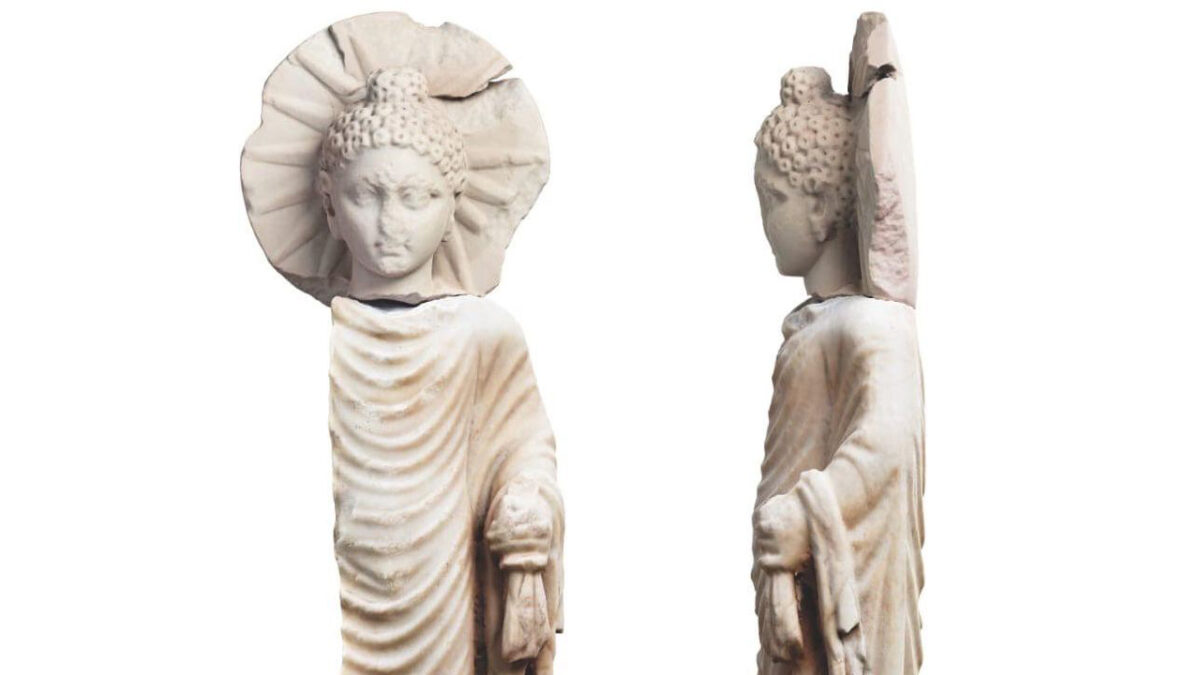Image: A second-century Buddha statue discovered in Berenike, an ancient Egyptian port city. Source: Egyptian Ministry of Tourism and Antiquities.
When the Himalayas Encounter the Alps: The Past, Present and Future of Asia-Europe Buddhist and Other Religious Exchanges
黑海東頭望大秦——亞歐佛教、宗教交流與合作:歷史、現狀與未來
Aug. 30-Sept. 2, 2024
Magdalene College, University of Cambridge
| Abstracts | Panelists | Schedule | Reports |
This conference is sponsored by the Glorisun Charity Foundation 旭日慈善基金, administered by the Glorisun Global Network for Buddhist Studies 旭日全球佛教研究網絡 (https://glorisunglobalnetwork.org) and FROGBEAR at the University of British Columbia (www.frogbear.org), and hosted at the University of Cambridge. It will take place from August 30, 2024 to September 2, 2024 in Magdalene College, the University of Cambridge.
The initial spark of interest and academic inquiry into Buddhism within Europe can be traced back to the endeavors of Christian missionaries across South, East, and Central Asia. The foundation of Buddhist Studies was thus laid through comparative textual studies in various classical languages, facilitating the emergence of specialized fields such as Abhidharma Studies and enabling the examination of Buddhism from historical, sociological, and anthropological perspectives. In recent decades, the rapid development of Chinese Buddhist databases have broadened academic interest in Chinese Buddhism. This expansion enriches the traditional research focus that has largely centered on Theravada, Tibetan, and Japanese Buddhism, thereby integrating Chinese Buddhism more fully into the broader spectrum of global Buddhist scholarship.
While the propagation of Buddhism to the West marks a relatively recent chapter in its history, the foundations of Buddhism are deeply entwined with ancient Indo-European civilization. This connection suggests not only a shared lineage with Indo-European religious traditions but also a linguistic heritage rooted in ancient Indo-European languages. Moreover, Buddhism has significantly absorbed and reflected the cultural and institutional legacies of Indo-European civilizations. On the opposite end of the Eurasian continent, the form of Chinese Buddhism as it is recognized today emerged only after a millennium of adaptation. Consequently, the history of Buddhism’s reception in Europe, extending over a century, combined with its deep-seated origins in Indo-European civilizations and the two-thousand-year evolution of Buddhism in China, establishes Buddhism as a crucial conduit for fostering dialogue and connections between Eastern and Western civilizations. In this context, Buddhism emerges as a potent catalyst for contemporary mutual understanding and cultural exchanges between Asia and Europe. This rich historical and cultural tapestry invites extensive scholarly inquiry and discussion, highlighting Buddhism’s integral role in the interweaving of global cultural heritage.
The topics of research for this conference include, but are not limited to:
- History of Buddhist and religious exchanges between Asia and Europe;
- The impact of Buddhist art and literature on cultural exchanges between Central Europe and Asia;
- The emergence and development of Buddhist Studies as an academic tradition in Europe;
- The history and contemporary development of ancient Indo-European religions in East Asia;
- Insights from Asian religions and Buddhist culture for contemporary European society;
- The impact of cultural differences on the exchange between Buddhism and other religions, and strategies for addressing them;
- Modernization of Buddhism and religions, and the dialogue and integration of different value systems;
- Prospect of Buddhist and Religious Studies;
- Opportunities and challenges for exchanges between Buddhist and and Religious Studies scholars in Asia and Europe;
- The potential for establishing cross-border collaborative research platforms between Asia and Europe;
- Cooperation models between traditional Buddhist and religious education and academic institutions in Asia and Europe.
As we contemplate the current landscape and delve into historical narratives, we find that Buddhism might have played a greater role than bringing Asia and Europe into contact; but rather, Buddhism acted as a rare medium bridging European, Near-Eastern, and Asian cultures in view of the influence of ancient European religions like Nestorianism, Zoroastrianism, and Manichaeism within Eastern contexts, partly thanks to Buddhism. This dual perspective enables us to extract valuable lessons from the past to enlighten our present and guide our future directions. Such an approach invites the possibility of crafting a new narrative centered on mutual advantages, collective advancement, and harmonious growth between Asian and European civilizations. Therefore, the global scholarly community is encouraged to embrace a broader international viewpoint, re-examining and re-evaluating the historical trajectory, present conditions, and future prospects of Buddhist and religious interactions between Europe and Asia.
The conference organizing committee welcomes submissions on any related topics. The costs associated with attendance, including accommodation and meals during the conference, will be covered by the organizers. Depending on the availability of funds, full or partial travel grants may be provided to participants in need. Please email your research proposal and curriculum vitae by April 15, 2024 to <frogbear.project@ubc.ca>.
The conference will result in the publication of a collection of papers in both Chinese and English. Scholars who are confident in completing a draft of their paper by the end of July 2024 and can complete a publishable paper by the end of November, 2024 are encouraged to apply.

